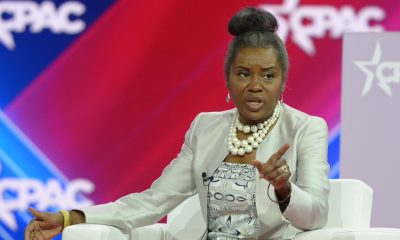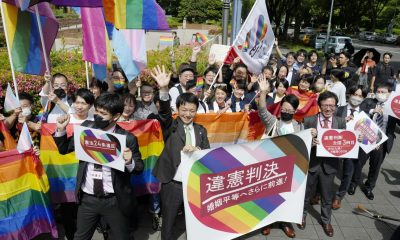Opinions
Still fighting for parental rights in Ireland
Every child of an LGBTQ parent deserves equality under the law
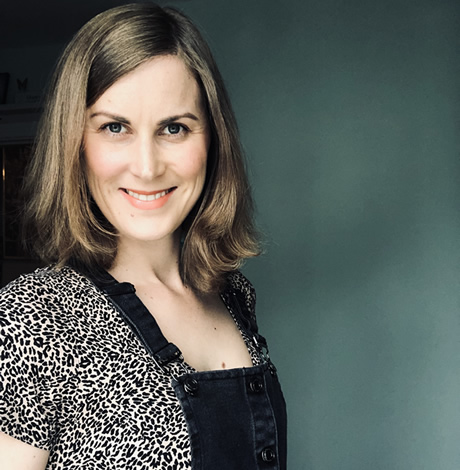
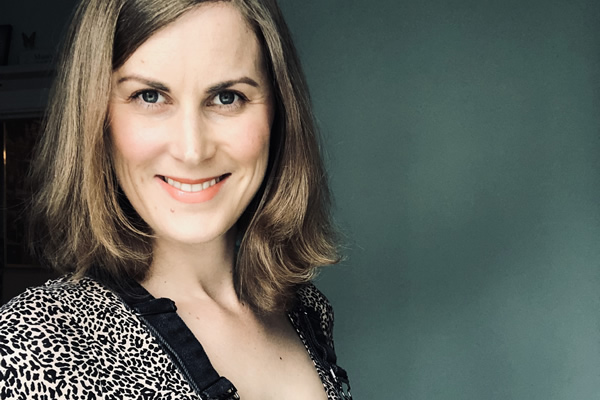
My name is Ranae and I live in Dublin, Ireland with my wife Audrey. Our daughters Ava and Arya are 4 and 2. Our girls have two mothers, yet I am still seen as a single parent.
Audrey and I were an unlikely couple from the start. She was in her fourth and I was in my first year of acting in a theater school in Dublin. We were paired together at an open day and became friends. We were so different, yet we immediately clicked. I knew Audrey wasn’t straight, but over the course of the next year, I had no idea that I was developing feelings for her. The day before my 21st birthday the realization hit me like a bolt of lightning. The feelings I had for her were so much more than just friendship. The rest, as they say, is history.
We have been together for 12 years now, and married for five. Audrey and I always knew we wanted to have kids and talked about this from the moment we started dating. We both have lots of siblings and knew that life wouldn’t be complete for us without having our own kids. I always dreamed about being pregnant and going through the process of growing and birthing a baby. Audrey, on the other hand, didn’t really want to be pregnant as long as she could become a parent. It was almost an unspoken thing that I would be the one to carry our child, should we go down the IVF route.
One night in early 2015, after a few glasses of wine, I had an idea. Wouldn’t it be cool if we could use Audrey’s eggs but I would carry the baby? This way, our children would genetically be Audreys, but I would be the birth mother. At the time it was just a silly idea we had. Little did we know that conversation would change the course of our lives. We decided to Google it and lo and behold, we found out that it wasn’t that crazy of an idea. Reciprocal IVF was actually an incredibly popular fertility treatment option for same-sex couples. At that moment, we knew that Reciprocal IVF was right for us.
When we tried to book a clinic appointment in Dublin, we were disappointed to find out that they wouldn’t treat us in Ireland. Back in 2015, Reciprocal IVF wasn’t licensed yet. In fact it’s only been licensed in the last year. We were given the option to do IUI/IVF with my own eggs, but at that point we had our hearts set on using Audrey’s eggs. Despite the setback, it made us more determined to find a way. We found a clinic in Spain and to be honest it was a bit of a crazy time for us. We didn’t know any other LGBTQ+ parents, let alone any who had undergone treatment abroad. We had no clue what we were doing, and made so many mistakes along the way. A few months later, we conceived our first child with the help of an anonymous sperm donor.
Conceiving our first child in the wake of marriage equality in Ireland was like a dream. Wrapped up in our little bubble of happiness, we went through that pregnancy with a sense of hope for our future. We got married when I was five months along and we celebrated a future that was finally equal. Little did we know what lay ahead of us.
Toward the end of my pregnancy, we learned something that devastated us. LGBTQ+ parents in Ireland were still not equal. I remember feeling so overwhelmed with emotions and going through various stages of shock. My first reaction was ‘but we are married and we voted for marriage equality last year.’
After consulting with a solicitor, we found out more. From the moment our daughter was born I would be a married woman but considered a single mother. I would be forced to register myself as a sole parent and our family would not be recognized under the law, simply because we were a same-sex couple. The simple difference was that I was married to a woman and not a man and because of this, Audrey would be a legal stranger to her own child.
There are some moments that stick with me. Moments that were stolen from us as a young family and ones that we will never get back. The day we registered Ava’s birth, we walked into the registration office and saw all the proud parents with their babies. When they called us into the room, the registrar sat down behind her desk. Without looking up she asked, ‘OK, so which one of you is the mother?’ We said, ‘We both are.’ ‘But which one of you gave birth?’ I said, ‘I did!’ She looked at me and said, ‘OK Ranae, I will be directing all my questions at you, if that’s OK?’ From that point on, she didn’t even look at Audrey. It felt like a kick in the gut. It was just all wrong.
That was the day I promised Audrey I was never going to stop fighting until we fixed this. I joked and said, well at least this will all be sorted out by the time we have another baby. How wrong I was. Fast forward to New Year’s Eve 2018 and I lie bleeding in the recovery suite with a second daughter, listening to fireworks, my heart breaking because I knew we were still in the same position as before. As it stands today, I am considered a single parent to our daughters. Our children, along with countless others in Ireland, are denied the right to a legal connection with both of their parents simply because their parents are a same-sex couple.
Much has changed in the last five years. In 2019, following on from an online petition that I started, we started a campaign called ‘Equality For Children’ along with a group of other LGBTQ+ parents. Since then we have been successful at lobbying the government for change and raising awareness of these issues within Ireland. Legislation was finally passed in 2020 that would allow certain LGBTQ+ families to have both parents legally recognized. Sadly it’s legislation that will only cover certain methods of conception. It’s great to see progress in the right direction, but it’s galling for anyone who falls outside of this and is still being actively discriminated against. Only female couples who have conceived in an Irish clinic with a non anonymous donor and a child born in Ireland are covered.
I can’t really put into words how damaging this has been for our family. To be reminded every day that you are ‘less than.’ That you are not equal. For your kids to be punished because their parents aren’t straight. In practical terms it’s an issue for children when one of their parents is unable to give medical consent, unable to travel freely with them, unable to make decisions on their behalf. But it goes beyond that, the emotional and physiological damage it has done to our families is immeasurable.
Following on from lengthy legal proceedings, our family soon hopes to be recognized. If we are, we will be one of the lucky ones. What about all those who fall outside of this? Are their children less deserving of equality? Because they have two dads? Because they were conceived outside of a clinic? Because they have a known donor? Because they weren’t born in Ireland?
This fight will never be over until every child of an LGBTQ+ parent in Ireland has the same rights and protections as any other child in the country.
Ranae von Meding is a writer and a same-sex parent to two young daughters with her wife Audrey. They live in Dublin, Ireland where she has become an outspoken advocate for equal rights for children of LGBTQ+ families. She is the co-founder and CEO of ‘Equality For Children.’ You can find her on Instagram at @ranaevonmeding.
Opinions
The power of queer community: When aid is cut, we don’t disappear. We organize
US funding withdrawal has had global impact

The global LGBTIQ+ movement is being systematically undermined, not just by eroding legal protections and escalating political harassment, but by the sudden withdrawal of vital funding. What began in the U.S. as a flurry of policy changes under Donald Trump has become a global flood of cuts, bans, and deliberate dehumanization. This week in Nairobi, prominent ultra-conservative campaigners from around the world, who are against abortion, transgender and LGBTIQ+ rights, and sexuality education, are speaking at the Pan-African Conference on Family Values.
Grassroots organizations, which are the backbone of queer survival and resistance around the world, are struggling to stay afloat. The global funding squeeze will and has already started to directly impact frontline organizations, forcing them to scale back, shut down programs, or close entirely.
In South Africa, support groups have slashed services due to the sudden disappearance of U.S. aid. In Mali, new laws criminalize LGBTIQ+ identities altogether. These regressions are not organic, they are engineered as American evangelicals continue to export anti-LGBTIQ+ ideologies across Africa.
In Europe, trans rights are being rolled back under the guise of biological essentialism, most recently validated by the U.K. Supreme Court’s ruling to exclude trans women from the legal definition of “woman.” In Hungary, LGBTIQ+ events have been constitutionally banned.
In the U.S., Trump is once again weaponizing his platform to push bans on gender-affirming care for minors and cut LGBTIQ+ research funding, all under the banner of “protecting children.” Elon Musk, once a corporate ally for LGBTIQ+ rights, now echoes far-right voices and launches transphobic tirades in tandem with personal attacks against his own daughter.
This is a coordinated, well-funded, and transnational anti-rights campaign to strip queer people of rights, dignity, and resources. At Hivos, we see this backlash as a call to deepen our commitment to centering queer voices, challenging harmful narratives with data and lived experiences, and working to strengthen the LGBTIQ+ movement globally.
We cannot fight this movement with performative IDAHOBIT posts on social media alone. We need action, international solidarity, and a recommitment to protecting queer lives.
What’s at stake?
This isn’t about identity politics. It’s about survival.
When the USAID funding freeze came into effect in early 2025, the Hivos-led EU SEE network conducted a survey on the impact of the freeze on civil society organizations around the world. Most surveyed organizations are reducing staff, scaling down programs, or reallocating budgets.
Outright International found that over 120 grants to LGBTIQ+ organizations in 42 countries were suspended following U.S. aid freezes with devastating consequences: lost access to trauma care for survivors of gender-based violence, the dismantling of HIV prevention networks, and increased discrimination, arrests, and violence.
Grassroots mutual aid groups in East Africa, working with minimal resources, have pioneered radical community models by providing housing, legal aid, and emergency support in the absence of government protection. These groups don’t just serve communities; they are the communities. Their defunding is not only cruel; it is a death sentence for countless individuals.
Economic justice and LGBTIQ+ liberation
Justice isn’t just legal, it’s economic. In most contemporary societies, justice is also closely tied to economic power. Around the world, LGBTIQ+ people face disproportionate levels of poverty, unemployment, housing insecurity, and workplace discrimination. Economic inclusion shouldn’t be an afterthought to queer rights around the world – it is foundational to their survival and dignity.
And yet, reports from Outright International, the Williams Institute, and the World Bank affirm that LGBTIQ+ economic inclusion benefits society as a whole. When the queer community is excluded, the human and financial costs are steep. The economic marginalization of LGBTIQ+ people lowers GDP, deepens inequality, and entrenches cycles of sexual and gender-based violence. So we also need systemic change that includes LGBTIQ+ people in broader economic opportunities — from education to employment and entrepreneurship opportunities.
There are strategies to bring LGBTIQ+ inclusion to the forefront. At Hivos, through the Free to be Me program, we have seen successes in LGBTIQ+ economic inclusion from the establishment of the Queer and Allied Chamber of Commerce of Africa to our partners in the Philippines successfully supporting the Lapu-Lapu city council’s Anti-Discrimination Ordinance. Positive developments like these are just one part of creating safer social, political, and legal environments allowing LGBTIQ+ people to have equal access to resources, opportunities, and decision-making.
What do we do now?
If governments won’t lead, then LGBTIQ+ communities and our allies must.
- Philanthropic foundations must step up. Some foundations have pledged to increase support, but the momentum pales in comparison to the urgency. Funding must be flexible, long-term, and led by community input.
- Media and influential individuals must confront hate speech head-on. Political leaders like Donald Trump aren’t “debating” gender identity — they’re inciting division and violence. Do not let bigotry define the narrative. Bigotry is not a “debate” its incitement
- Corporations must put money where their rainbows are. Pride-themed products without meaningful reinvestment into queer causes are nothing more than branding and pinkwashing. Corporations must ensure LGBTIQ+ employees are supported and protected.
- Solidarity demands more than words, donating directly to grassroots organizations and mutual aid funds. Speak up. Pressure local leaders. Boycott non-inclusive organizations and corporations. Demand change.
- Bring LGBTIQ+ voices into policymaking spaces. When the LGBTIQ+ community participates in the legislative process — and when advocates and organizations receive the funding they need to support long-term, transformative impact — the potential for positive change and inclusivity is endless.
Continuing the fight from previous generations
Queer communities have always faced adversity with grit, love, and radical imagination. But resilience is not infinite. Without funding, protection, and political will, resilience can end up in burnout.
Let’s do more than celebrate the queer community — let’s mobilize. We can take inspiration from the 2024 protests in Peru against a law classifying transgender people and other LGBTIQ+ people as mentally ill, which succeeded in getting the law scrapped within a month. The future of LGBTIQ+ rights will not be decided in courtrooms or campaign rallies alone. It will also depend on whether we show up right now, with our money, our voices, and our actions. Because when aid is cut, we don’t disappear. We organize.
Susan Githaiga is a Pan-African, feminist and human rights defender grounded in the belief that none of us are free until all of us are free as inspired by Lilla Watson and collective Black feminist thought. As the Global Program Manager of Free to Be Me Hivos, she leads a transformative initiative across 12 countries in Africa, MENA, and Southeast Asia, partnering with over 160 LGBTIQ+ CSOs and movements to advance human and economic rights and resilience. A strategist, bridge-builder and movement weaver, Susan thrives at the intersection of advocacy and grassroots power.
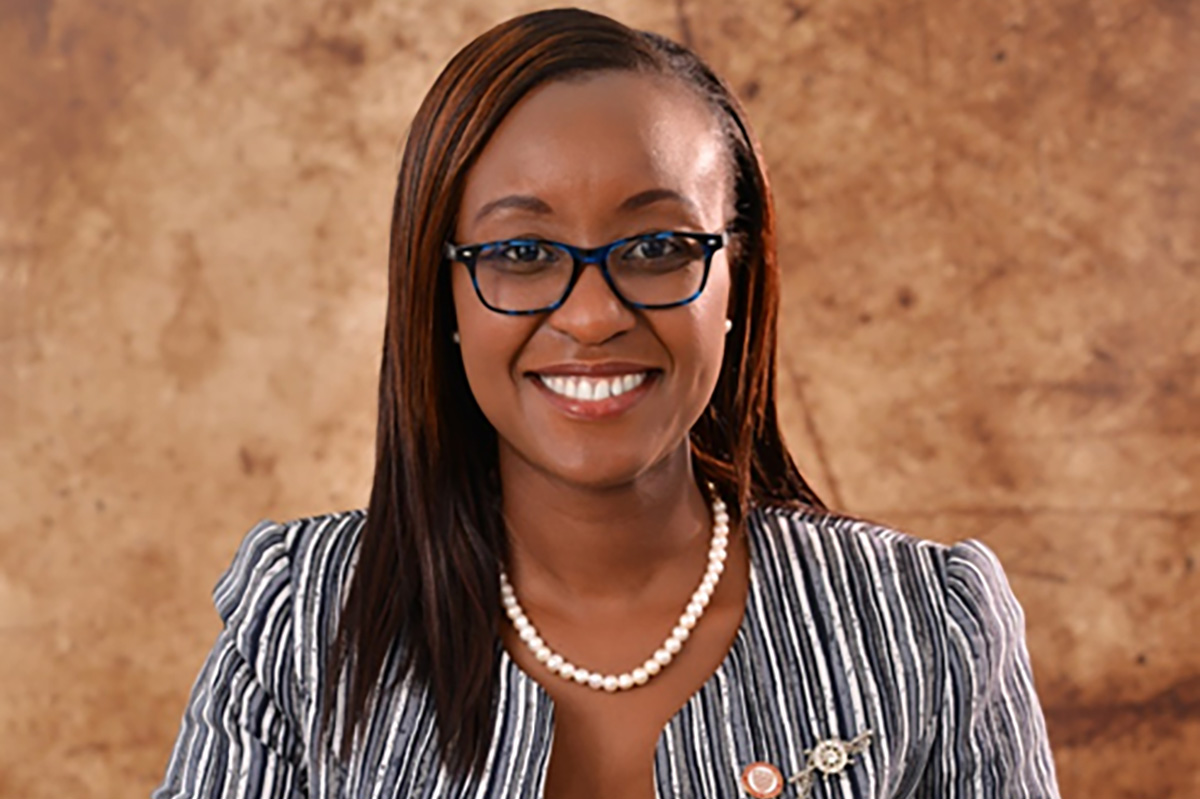
Opinions
My chance encounter with a pope and why goodness still matters
Early morning Vatican stroll turns into unforgettable memory
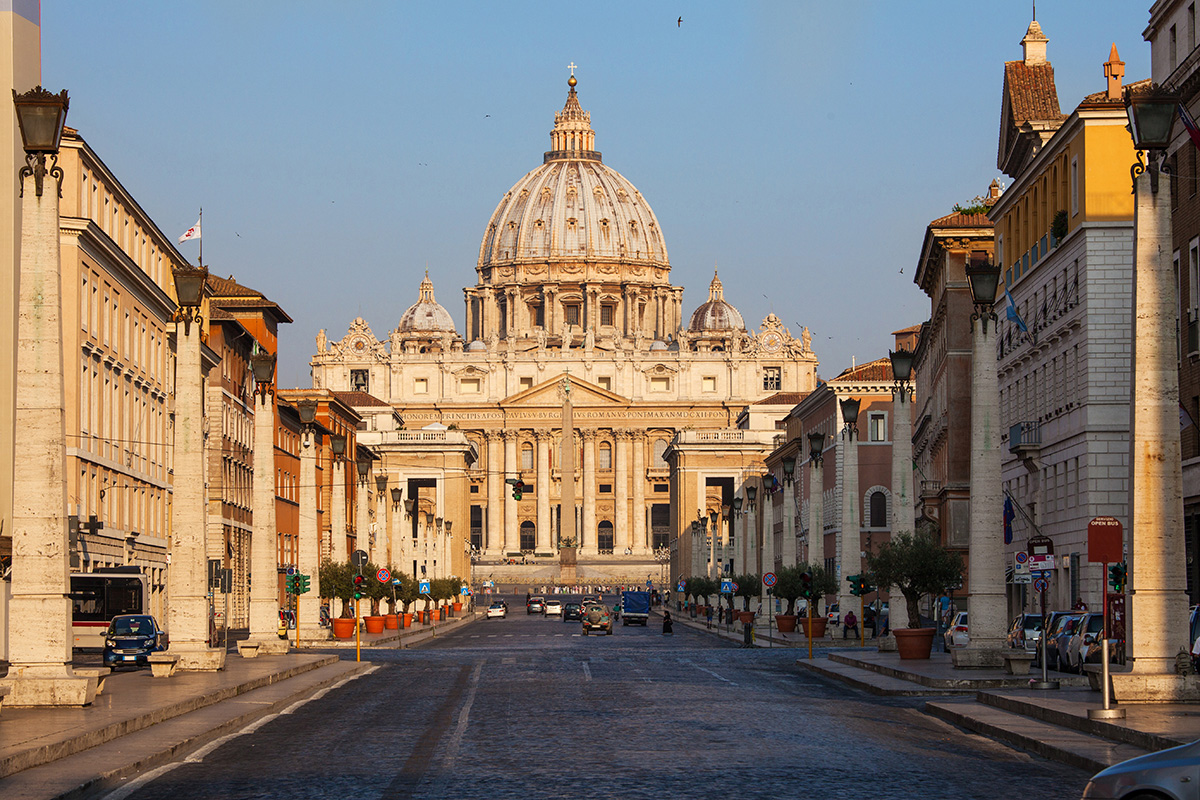
It’s not every day you meet a pope. Mine was Pope John Paul. In the recent passing of Pope Francis, and all the love and generosity of this ”People’s Pope,” I was reminded of a similar man, with a similar heart, who I had the fortune to one day meet.
There’s no real yardstick for measuring a man who’s the head of an institution that has been around since the Romans, who commands the respect of more than a billion people, and whose job it is to keep alive a 2,000-year-old message of love, hope, generosity, and salvation.
I wasn’t planning on meeting him. More like it was fated, or I’d like to believe that.
I was on a spiritual journey of my own. My schoolwork was over in Norway, and I was headed to Lebanon to write about the war there. I was a young man of 17, trying to figure out the world and how it worked — or didn’t.
It was a week before Easter when I found myself in Rome, standing at the far edge of St. Peter’s Square. As I remember, it was very early and a very beautiful morning, sometime around six or so. Even at that age, I found great solace in the solitude of the early morning. It’s as if I had the entire Square to myself, reflecting on this singular moment in time that I was alone in one of the greatest places of spiritual gathering in the world.
But I wasn’t alone. Next to the fountain where I had parked my backpack laid a man, curled up next to the stone wall, in the gentle universal snore of inebriation. I quietly cupped some water to wash my face and neck, which apparently was enough to stir the man from his sleep.
I nodded my head at him, smiled, and gave a short wave in the universal sign that we were all good and passing fellows. He groggily waved back. I was about to gather up my rucksack and head out when I saw a man strolling across the far side of the Square, about 100 yards away He was in no hurry, which intrigued me. Another soul in search of morning quietude, I thought to myself. He sauntered along, thoroughly enjoying the morning air, occasionally looking up at the sky, which was equally as intriguing.
He was a happy man who was happy to be alive. I thought it was remarkable that on that morning, there were two happy people in the world, and they were both in St. Peter’s Square.
As if a bee to a flower, the man took a direction to a small group of people, three or four more souls walking together who stopped as the man approached them. I saw one of them reach out for the man’s hand and then he kissed it. Now my curiosity turned to wonderment, trying to understand what was taking place.
My Roman fountain friend began a slow drunken babble to me as he gestured toward the small cluster that I was evidently staring at. His Italian was as good as my English, and that was the end of it. Though he continued to say, “Papa, Papa.” I queried him back, having no clue what his Papa was. Then he sat up as if to collect every ounce of clarity that still inhabited him and said, “Pope-a.” I pointed to the group. “The Pope?” He nodded his head and said, “Si. Il Pope-a” (which I later understood was a combination of the affectionate and respectful use of Papa for the Pope, combined with our English version — thus, “Pope-a”).
He smiled. I smiled. The apostle of the fountain had conveyed his message, and I was on my way to meet the pope.
Quickly, I made my way to the small gathering. I was a little unsure of how to add myself to the procession, as small as it was. My mind started to whirl with pope-laden imaginings. Would he be talking in Latin? Wearing silk robes? Would he be holding some relic of St. Peter’s golden staff?
I then slowed my walk, brought myself to the edge of the group, and there he was — the pope, John Paul himself. He was smaller than I had imagined. No staff or silk robes. He was chatting up the small group as if they were neighbors meeting in the middle of the sidewalk, exchanging news of the neighborhood or the latest sport’s scores, all in a breezy mixture of Italian and English.
He then spotted me and waved me over. I froze for a moment. With no time to study the Pope Manual of Papal Etiquettecy, I had no clue if I should kiss the ring or the hand, or shake it, or what? Not being Catholic, I was not versed on how to properly greet a pope.
I then did what any non-Catholic American 17-year-old kid on a spiritual journey would do: I combined a handshake with a nod/kiss on the hand and the biggest kid-smile I could muster. He smiled back, with the understanding of what it was to be a pope and meet a kid like me both in awe and in happiness at being together there on the Sunday morning in St. Peter’s Square.
He asked me a few questions for which I have no memory of my answers. It didn’t matter. I was talking with the pope.
There was no Instagram, or Facebook, or selfie-taking back then. Everyone somehow understood that this was a moment you stored in your mind and in your heart. To take pictures would have somehow sullied it, and everyone knew it.
John Paul was a man on a morning stroll, who shared his intimate time with a group of fellow morning seekers. He was warm, kind, and cordial — a prince of a fellow in my book. The type of man you could talk to in a bar, or on a train, or on a park bench. He practiced the generosity that is the best of the human spirit — to give without expecting anything in return. A gift of love that needs no bartering or transaction to fulfill it.
Lately, and with the recent passing of Pope Francis, I thought I needed to commemorate this memory of this day on paper. Watching how generous Pope Francis was with his love, to the children, to the sick and poor, to the downtrodden, to those who are so easily trampled over in the modern day haste to make civilization “better” and “faster,” it was no stretch to remember another man who so equally and mightily gave his heart and soul to others.
In a world where so many are seemingly trying to figure out who to hate and how to hate them, I find great solace in knowing that there are those who understand that the better angels of our nature are to be better.
On a beautiful Sunday morning, in the small tide of the oceans of history, I met with a man who helped me to remember once again that the Golden Rule is golden because it shines with goodness, grace, and generosity, and that is no small endeavor for all of us to journey toward in all of our lives.
Carew Papritz is the award-winning author of ‘The Legacy Letters’ who inspires kids to read through his ‘I Love to Read’ and ‘First-Ever Book Signing’ YouTube series.
Commentary
‘A New Alliance for a New Millenium, 2003-2020’
Revisiting the history of gay Pride in Washington
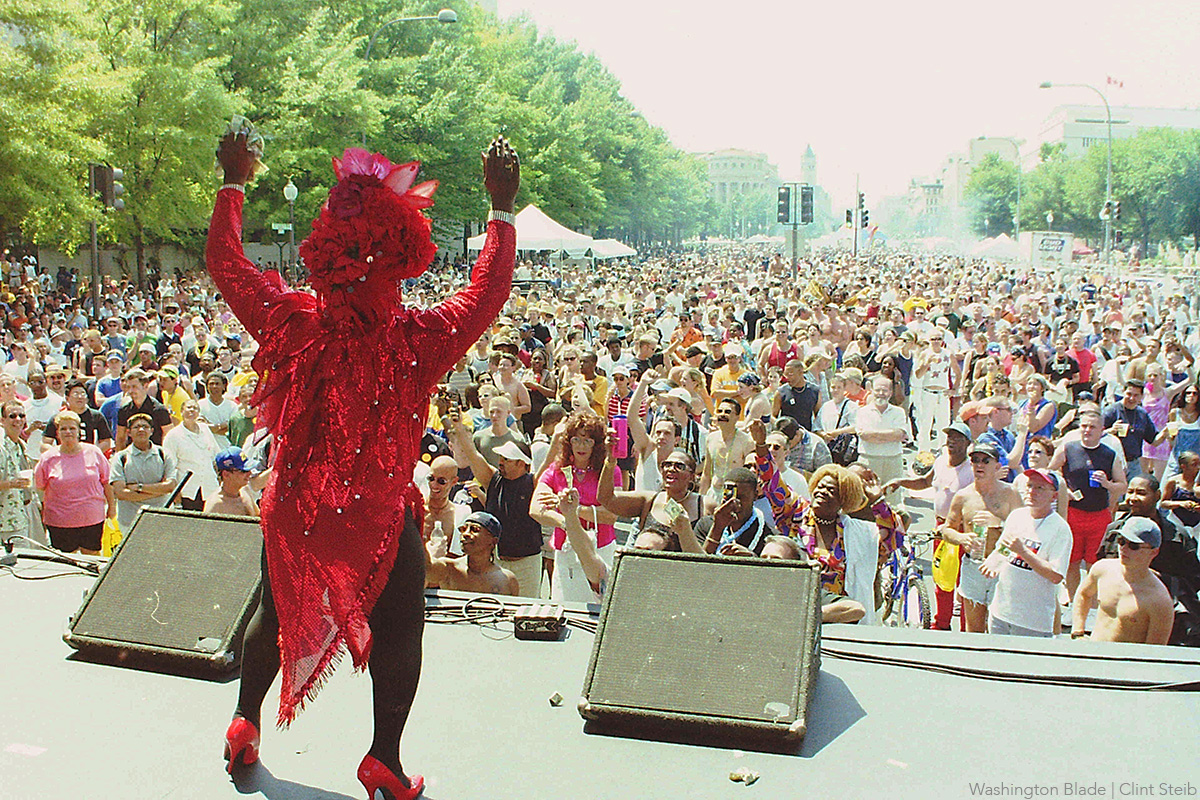
In conjunction with WorldPride 2025, the Rainbow History Project is creating an exhibit on the evolution of Pride: “Pickets, Protests, and Parades: The History of Gay Pride in Washington.” It will be on Freedom Plaza from May 17-July 7. This is the ninth in a series of 10 articles that share the research themes and invite public participation. In “A New Alliance for a New Millenium” we discuss how Whitman-Walker’s stewardship of Pride led to the creation of the Capital Pride Alliance and how the 1960s demands of the Mattachine Society of Washington were seen as major victories under the Obama administration.
This section of the exhibit explores how the Whitman-Walker Clinic, a cornerstone of the community since the 1970s, stepped up to rescue Pride from a serious financial crisis. The Clinic not only stabilized Pride but also helped it expand, guiding the festival through its 30th anniversary and cementing its role as a unifying force for the city’s LGBTQ population. As Whitman-Walker shifted its focus to primary healthcare, rebranding as Whitman-Walker Health, a new era began with the formation of the Capital Pride Alliance (CPA). Born from the volunteers and community partners who had kept Pride going, CPA took the reins and transformed Capital Pride into one of the largest free LGBTQ festivals in the country. Under CPA’s stewardship, the festival grew to attract hundreds of thousands, with multi-day celebrations, headline performers, and a vibrant parade.
This period saw Pride become a true cross-section of the community, as former Capital Pride Alliance executive director Dyana Mason recalled: “It was wonderfully diverse and had a true cross section of our community… Everybody was there and just being themselves.” The festival’s expansion created space for more people to find a sense of belonging and affirmation. This growth was made possible through the support of sponsors, volunteers, and a city eager to celebrate-but it also sparked ongoing debates about the role of corporate funding and the meaning of Pride in a changing world.
National politics are woven throughout this era. In a powerful moment of recognition, Frank Kameny — the architect of D.C.’s first White House picket for gay rights and a founder of the Mattachine Society — was invited to the White House in 2009. There, President Obama and the U.S. government formally apologized for Kameny’s firing from federal service in 1957, a symbolic act that echoed the earliest demands of DC’s own Mattachine Society, the city’s first gay civil rights organization founded in 1961. The 2009 National Equality March revived the spirit of earlier mass mobilizations, linking LGBTQ rights to broader movements for social justice. The 2010s brought landmark victories: “Don’t Ask, Don’t Tell” was repealed, marriage equality became law. These wins suggested decades of protest had borne fruit, yet new generations continued to debate the meaning of true liberation and inclusion.
Our exhibit examines how the political edge of Pride has softened as the event has grown. As the festival expanded in scale and visibility, the focus on protest and activism has sometimes faded into the background, even as new challenges and divisions have emerged. Some voices have called for a return to Pride’s more radical roots. The 2017 Equality March for Unity and Pride drew 80,000 people to D.C., centering intersectional struggles — police violence, immigrant rights, trans inclusion — and exposing the widening rift between mainstream LGBTQ progress and the lived realities of the most vulnerable. The question remains: Are LGBTQ officers marching in uniform a sign of progress or a painful reminder of Pride’s roots in resistance to state violence? During Capital Pride 2017, activists blocked the parade, targeting floats sponsored by corporations linked to weapons manufacturing, pipeline financing, and other forms of oppression.
As we prepare for WorldPride and the anniversaries of D.C.’s first Gay Pride Day Block Party and the White House picket, the Rainbow History Project invites you to experience this living history at Freedom Plaza. Through archival images and the voices of organizers and participants, you’ll discover how Pride in DC has been shaped by resilience, reinvention, and the ongoing struggle to ensure every voice is heard.
Zoey O’Donnell is a member of the Rainbow History Project. Vincent Slatt is RHP’s senior curator.
-
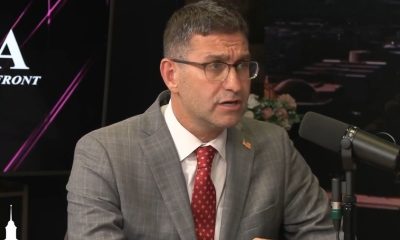
 Rehoboth Beach13 hours ago
Rehoboth Beach13 hours agoDel. Gov. Meyer to join Washington Blade party in Rehoboth on Friday
-
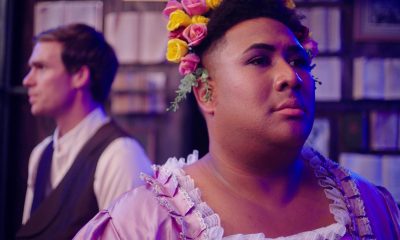
 Movies5 days ago
Movies5 days agoQueer history, identity interweave in theatrical ‘Lavender Men’
-
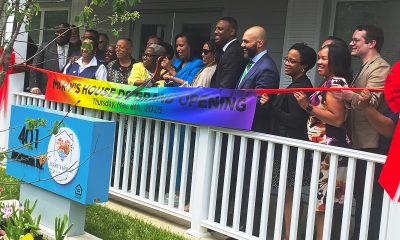
 District of Columbia4 days ago
District of Columbia4 days agoMayor joins ribbon-cutting for opening of D.C. LGBTQ seniors home
-
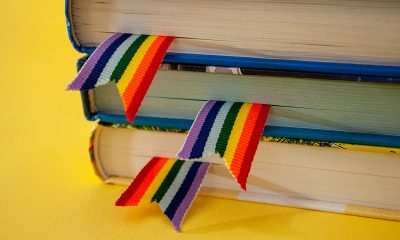
 Books4 days ago
Books4 days agoI’m a lesbian and LGBTQ books would have changed my life

